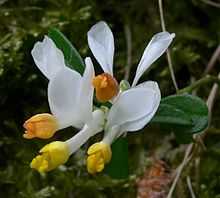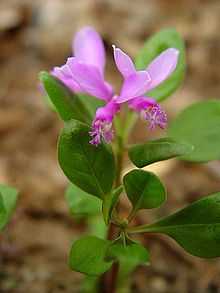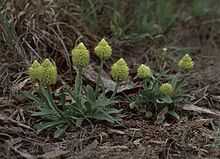Polygala
| Polygala | |
|---|---|
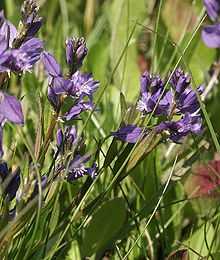 | |
| Polygala vulgaris | |
| Scientific classification | |
| Kingdom: | Plantae |
| (unranked): | Angiosperms |
| (unranked): | Eudicots |
| (unranked): | Rosids |
| Order: | Fabales |
| Family: | Polygalaceae |
| Genus: | Polygala L. |
| Species | |
|
See text. | |
Polygala is a large genus of flowering plants belonging to the family Polygalaceae. They are commonly known as milkworts or snakeroots. The genus is distributed widely throughout much of the world[1] in temperate zones and the tropics.[2] The genus name Polygala comes from the ancient Greek "much milk", as the plant was thought to increase milk yields in cattle.[3]
Description
Polygala includes annual and perennial plants, shrubs, vines, and trees.[1] The roots often have a scent reminiscent of wintergreen.[2] The leaf blades are generally undivided and smooth-edged, and are alternately arranged in most species. The inflorescence is a raceme or spikelike array of several flowers; the occasional species bears solitary flowers.[2] The flower is bilateral in shape, with two large petal-like sepals on the sides, often called the "wings",[2] and three smaller sepals behind. There are three petals in shades of reddish purple, yellow, or white, which are joined at the bases. The lower of the three is the keel petal, which is "boat-shaped, cucullate [hood-like], or helmet-shaped".[1] The keel petal may have a beak or a fringe on the tip.[2] Stamens and style are within the curve of the keel petal. The fruit is a capsule, sometimes winged. It contains 2 seeds[1] which are usually black, hairy, and tipped with a large white aril.[2]
Ecology
Polygala species are used as food plants by the larvae of some Lepidoptera species including large grizzled skipper.
Uses
Some species are valued in cultivation. The hybrid evergreen shrub P. × dalmaisiana (P. myrtifolia × P. oppositifolia) has gained the Royal Horticultural Society's Award of Garden Merit.[4]
Diversity
The reported number of valid species in the genus varies from about 350[5] to 500[1][2] to 725[6] or 730.[7] The Americas have the most species, especially South America,[7] with Africa second in diversity and Asia third.[6]
Species include:[8][9][10][11][12][13]
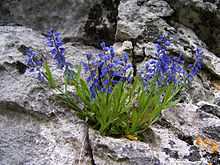
.jpg)
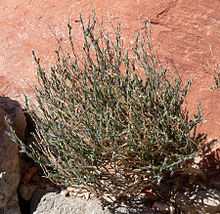
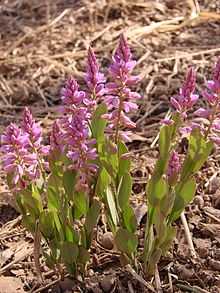
- Polygala acanthoclada – desert polygala
- Polygala africana
- Polygala alba – white milkwort
- Polygala alpestris – alpine milkwort
- Polygala amara – bitter milkwort
- Polygala amarella – dwarf milkwort
- Polygala ambigua – whorled milkwort
- Polygala apopetala
- Polygala arillata
- Polygala arvensis – Australian milkwort
- Polygala asbestina
- Polygala balduinii – Baldwin's milkwort
- Polygala barbeyana – blue milkwort
- Polygala bifoliata
- Polygala boykinii – Boykin's milkwort
- Polygala brevifolia – littleleaf milkwort
- Polygala butyracea – black beniseed
- Polygala calcarea – chalk milkwort
- Polygala californica – California milkwort
- Polygala canaliculata
- Polygala chamaebuxus – shrubby milkwort
- Polygala chapmanii – Chapman's milkwort
- Polygala chinensis
- Polygala comosa – tufted milkwort
- Polygala cornuta – Sierra milkwort
- Polygala cowellii – tortuguero, violet tree
- Polygala crassitesta
- Polygala crenata – scalloped milkwort
- Polygala crotalarioides
- Polygala crucianelloides – Caribbean milkwort
- Polygala cruciata – drumheads
- Polygala curtissii – Curtiss' milkwort
- Polygala cymosa – tall pinebarren milkwort
- Polygala dasyphylla
- Polygala eriocephala
- Polygala erubescens
- Polygala exsquarrosa
- Polygala floribunda
- Polygala fruticosa – featherdusters, heart-leaved polygala, ithethe
- Polygala gerrardii
- Polygala glandulosa – glandular milkwort
- Polygala glochidiata – tropical milkwort
- Polygala grandiflora – showy milkwort
- Polygala hecatantha – West Indian milkwort
- Polygala hemipterocarpa – winged milkwort
- Polygala heterorhyncha – beaked spiny milkwort
- Polygala hookeri – Hooker's milkwort
- Polygala hottentotta – small purple broom
- Polygala incarnata – procession flower
- Polygala intermontana – Intermountain milkwort
- Polygala japonica
- Polygala karensium
- Polygala klotzschii
- Polygala langebergensis
- Polygala lasiosepala
- Polygala leptocaulis – swamp milkwort
- Polygala leptostachys – Georgia milkwort
- Polygala lewtonii – Lewton's polygala
- Polygala linariifolia – native milkwort
- Polygala lindheimeri – shrubby milkwort
- Polygala longicaulis – longstem milkwort
- Polygala longifolia
- Polygala lutea – orange milkwort
- Polygala macowaniana
- Polygala macradenia – glandleaf milkwort
- Polygala major
- Polygala maravillasensis – Maravillas milkwort
- Polygala mariana – Maryland milkwort
- Polygala microphylla
- Polygala monspeliaca – annual milkwort
- Polygala mossii
- Polygala myrtifolia – butterfly-bush, parrotbush, myrtle-leaf milkwort, cascade curse, augustusbos (Afrikaans)
- Polygala nana – candyroot
- Polygala nicaeensis – Nice milkwort
- Polygala nitida – shining milkwort
- Polygala nudata – smallflower milkwort
- Polygala nuttallii – Nuttall's milkwort
- Polygala obscura – velvetseed milkwort
- Polygala ohlendorfiana
- Polygala ovatifolia – eggleaf milkwort
- Polygala palmeri – Palmer's milkwort
- Polygala paniculata – island snakeroot, orosne, ipecacuana, hoja de higo
- Polygala paucifolia – fringed milkwort, gaywings
- Polygala penaea – crevajosa
- Polygala persicariifolia
- Polygala piliophora – Huachuca Mountain milkwort
- Polygala planellasii – Planellas' polygala
- Polygala polifolia
- Polygala polygama – racemed milkwort[14]
- Polygala pottebergensis
- Polygala pungens – doringertjie
- Polygala ramosa – low pinebarren milkwort
- Polygala rectipilis – New Mexico milkwort
- Polygala rehmannii – bolao-bo-boholo
- Polygala rimulicola – Steyermark's milkwort
- Polygala rugelii – yellow milkwort
- Polygala rusbyi – Rusby's milkwort
- Polygala sanguinea – purple milkwort, blood milkwort, field milkwort
- Polygala scabra
- Polygala scoparioides – broom milkwort
- Polygala sekhukhuniensis
- Polygala senega – Seneca snakeroot, senega[14]
- Polygala serpentaria – kafferslangwortel
- Polygala serpyllifolia – thyme-leaved milkwort
- Polygala setacea – coastal plain milkwort
- Polygala sibirica – Siberian polygala
- Polygala smallii – tiny milkwort
- Polygala subspinosa – spiny milkwort
- Polygala succulenta
- Polygala tatarinowii
- Polygala tenuifolia – Chinese senega-root, yuan zhi (Chinese: 遠志)
- Polygala tepperi
- Polygala teretifolia – bothaseblombossie
- Polygala triflora
- Polygala umbellata
- Polygala vayredae
- Polygala venenosa
- Polygala verticillata – whorled wilkwort
- Polygala violacea – violet milkwort
- Polygala virgata – butterfly-bush, purple-broom
- Polygala vulgaris – common milkwort
- Polygala watsonii – Watson's milkwort
- Polygala wattersii
References
| Wikimedia Commons has media related to Polygala. |
- ↑ 1.0 1.1 1.2 1.3 1.4 Polygala. Flora of China.
- ↑ 2.0 2.1 2.2 2.3 2.4 2.5 2.6 Polygala. The Jepson eFlora 2013.
- ↑ Coombes, A. J. (2012). The A to Z of Plant Names. USA: Timber Press. p. 312. ISBN 9781604691962.
- ↑ "RHS Plant Selector - Polygala × dalmaisiana". Retrieved 27 May 2013.
- ↑ Coelho, V. P. D. M., et al. (2008). Flora of Paraíba, Brazil: Polygala L.(Polygalaceae). Acta Botânica Brasilica 22(1), 225-39. (Portuguese)
- ↑ 6.0 6.1 Lüdtke, R., et al. (2013). The genus Polygala L.(Polygalaceae) in Southern Brazil. Hoehnea 40(1), 1-50. (Portuguese)
- ↑ 7.0 7.1 Pastore, J. F. B. and T. B. Cavalcanti. (2008). A New Species of Polygala (Polygalaceae) from Brazil. Novon 18(1), 90-93.
- ↑ Polygala. North American species. USDA PLANTS.
- ↑ Polygala: list of species. Flora of China.
- ↑ GRIN Species Records of Polygala. Germplasm Resources Information Network (GRIN).
- ↑ Polygala. FloraBase. Western Australian Herbarium.
- ↑ Polygala. Atlas of Living Australia.
- ↑ Polygala. Red List of South African Plants. SANBI.
- ↑ 14.0 14.1 Dickinson, T., et al. (2004). ROM Field Guide to Wildflowers of Ontario. Royal Ontario Museum, Toronto. McClelland and Stewart Ltd. p 336.
.jpg)
